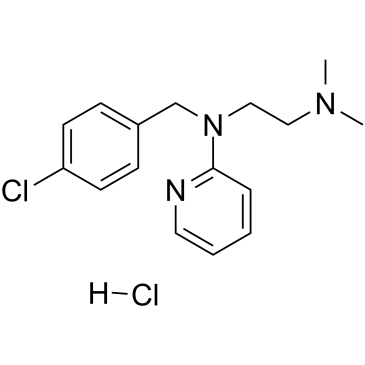Chloropyramine hydrochloride |
| Catalog No.GC32979 |
Chloropyramine hydrochloride is a histamine receptor H1 antagonist which can also inhibit the biochemical function of VEGFR-3 and FAK.
Products are for research use only. Not for human use. We do not sell to patients.

Cas No.: 6170-42-9
Sample solution is provided at 25 µL, 10mM.
Chloropyramine hydrochloride is a histamine receptor H1 antagonist which can also inhibit the biochemical function of VEGFR-3 and FAK.
BT474 cells are highly sensitive to Chloropyramine hydrochloride (compound 1) treatment, whereby 1 µM concentrations cause a 40% reduction of viability after 48 h of treatment. It is found that at 1 µM concentrations of Chloropyramine hydrochloride, viability of control MCF7-pcDNA3 cells is significantly higher than the viability of MCF7-VEGFR-3 cells (P<0.01) and at 10 µM concentration this difference reaches twofold (P<0.001). In the BT474 cells treatment with Chloropyramine hydrochloride also leads to a concentration-dependent decrease of cell proliferation. When treatment with Chloropyramine hydrochloride is continued for 48 h, the breast cancer cells that overexpressed VEGFR-3 undergo apoptosis. This effect is dose-dependent, with 10 µM Chloropyramine hydrochloride inducing apoptosis in more than 60% of BT474 cells. In our model cell lines MCF7-pcDNA3 and MCF7-VEGFR-3, treatment with 10 µM Chloropyramine hydrochloride for 48 h leads to a 4-fold increase in apoptotic cell death in the cell line that overexpressed VEGFR-3 (18% versus 76 % respectively)[1].
Chloropyramine hydrochloride causes a dramatic reduction of tumor growth in both model systems whereby the tumor size in the treated groups is approximately 20% of the tumor size in vehicle control groups. Doxorubicin administered at 3 mg/kg causes approximately 60% reduction of tumor growth, but has no effect on tumor growth at 0, 3 mg/kg. In contrast, there is a modest effect of Chloropyramine hydrochloride alone (50% reduction of tumor growth). The low-dose combination of Chloropyramine hydrochloride and doxorubicin has a prolonged anti-tumor effect (85% reduction of tumor growth) that is greater than either drug alone[1].
[1]. Kurenova EV, et al. Small molecule chloropyramine hydrochloride (C4) targets the binding site of focal adhesion kinase and vascular endothelial growth factor receptor 3 and suppresses breast cancer growth in vivo. J Med Chem. 2009 Aug 13;52(15):4716-24.
Average Rating: 5 (Based on Reviews and 13 reference(s) in Google Scholar.)
GLPBIO products are for RESEARCH USE ONLY. Please make sure your review or question is research based.
Required fields are marked with *




















